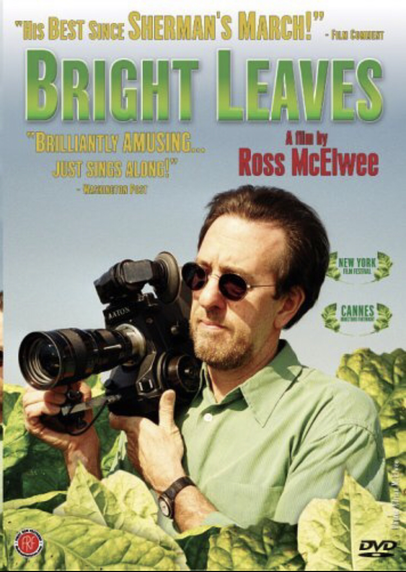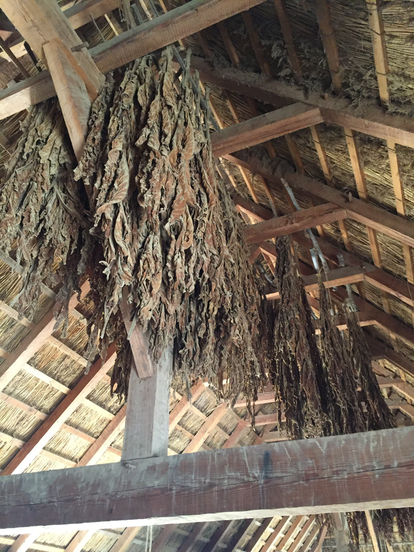 Sam Burnham, Curator A trusted Carolinian put me on film. I had never heard on the film or the filmmaker before. My friend spoke with ease and familiarity about both which left me thinking I had missed something major. So I searched it down and had a late night screening of the 2003 Ross McElwee film Bright Leaves. In the opening scene McElwee tells of a dream of leaves. These aren’t your typical leaves that you rake from your lawn. His description is of some monstrous plants from the age of dinosaurs or something. He and his wife come to an agreement that is his Southern homeland calling for him. She tells him the South is in his blood and that he has been looking a bit anemic lately. McElwee is a Southern expat in New England and Carolina requested his presence. The South does that to her wayward children. The film put me in a similar mindset as the Errol Morris documentary Vernon, Florida. McElwee went out and found ordinary North Carolinians to create the documentary. The cast of characters is not nearly as quirky or odd as the residents of Vernon but it still makes for an authentic homegrown experience. It tells a story or people progressing though history. There are villains and victims, traditions, memories, legends - dubious and factual.  Tobacco: 400 Years in The South Tobacco: 400 Years in The South At the center of it all is the old rivalry between the McElwee family and the Duke family - North Carolina's tobacco barons. The Dukes are well known for their tobacco empire, Duke University, Duke Health, Duke Energy, you know, Duke. The McElwees are known very little these days. Through this film we see evidence that John Harvey McElwee, Ross McElwee's great-grandfather, developed the Durham Bull brand of smoking tobacco and that his foreman stole and then sold the formula to the Dukes. The Dukes then allegedly released the product reflagged as the Bull Durham brand which made them wildly successful. The Duke family remains wealthy in treasure and legacy. McElwee died bankrupt and obscure. What impacted me most about the film is the contrast, the contradictions, that Southern duality that runs throughout the film. It is best represented in Ross McElwee's explanation that he has all the guilt of the effects tobacco has had on the lives of people while enjoying none of the financial benefits of being an heir to the inventor of one of the most successful brands. He sees himself as both a perpetrator and a victim. You just don't get any more Southern than that. Going through Southern History is noticing centuries of this duality. Southerners committed the crime of slavery and were the victims of the crime of Sherman's March. They committed the Indian Removal and then suffered the invasion of the Carpetbaggers. They have grown tobacco and distilled whiskey and suffered the side effects. Now faced with the choice of halting tobacco production or preserving a way of life, people are indecisive. Tobacco isn’t just economics to them. It’s history, it’s aesthetics, it’s their identity. How do you just eliminate such a part of your very self?  That duality is a part of our existence. Slavery and Jim Crow will never be not wrong. Sherman's March will never be justified. The evils of our past, both given and received, are magnified by a culture that so reveres and bathes in the past. Everything we see today came through all those evils and we know it. It is personified in both this film and the filmmaker. But the film goes further, just as our culture has. McElwee questions his subjects about their tobacco habits. He highlights smokers and his inquiries on their intentions to quit or continue. He highlights the efforts of the Duke empire to ameliorate the illnesses attributed to tobacco use. He covers the 50th Annual Tobacco Festival of Clarkton. It was the last year of it by that name. The "Farmer's Day" moniker was to be adopted the next year. That blatant attempt to cleanse and add something more "acceptable" to the culture has become an everyday occurrence. The South finds itself in a struggle between those who would remove "problematic" elements of our culture and those who would preserve the culture. This struggle is based in that victim/perpetrator duality that no amount of scrubbing will ever eliminate. Regardless of the efforts, The South endures. And so I can confidently finish with recommendation for this gritty and wonderful film. It highlights this corner of The South with stark reality delivered with McElwee's soft-spoken narration. Let it take you for a ride. Let it make you think. Go where it leads you and find yourself in a familiar place.
0 Comments
Leave a Reply. |
Sam B.Historian, self-proclaimed gentleman, agrarian-at-heart, & curator extraordinaire Social MediaCategories
All
Archives
November 2022
|




 RSS Feed
RSS Feed
